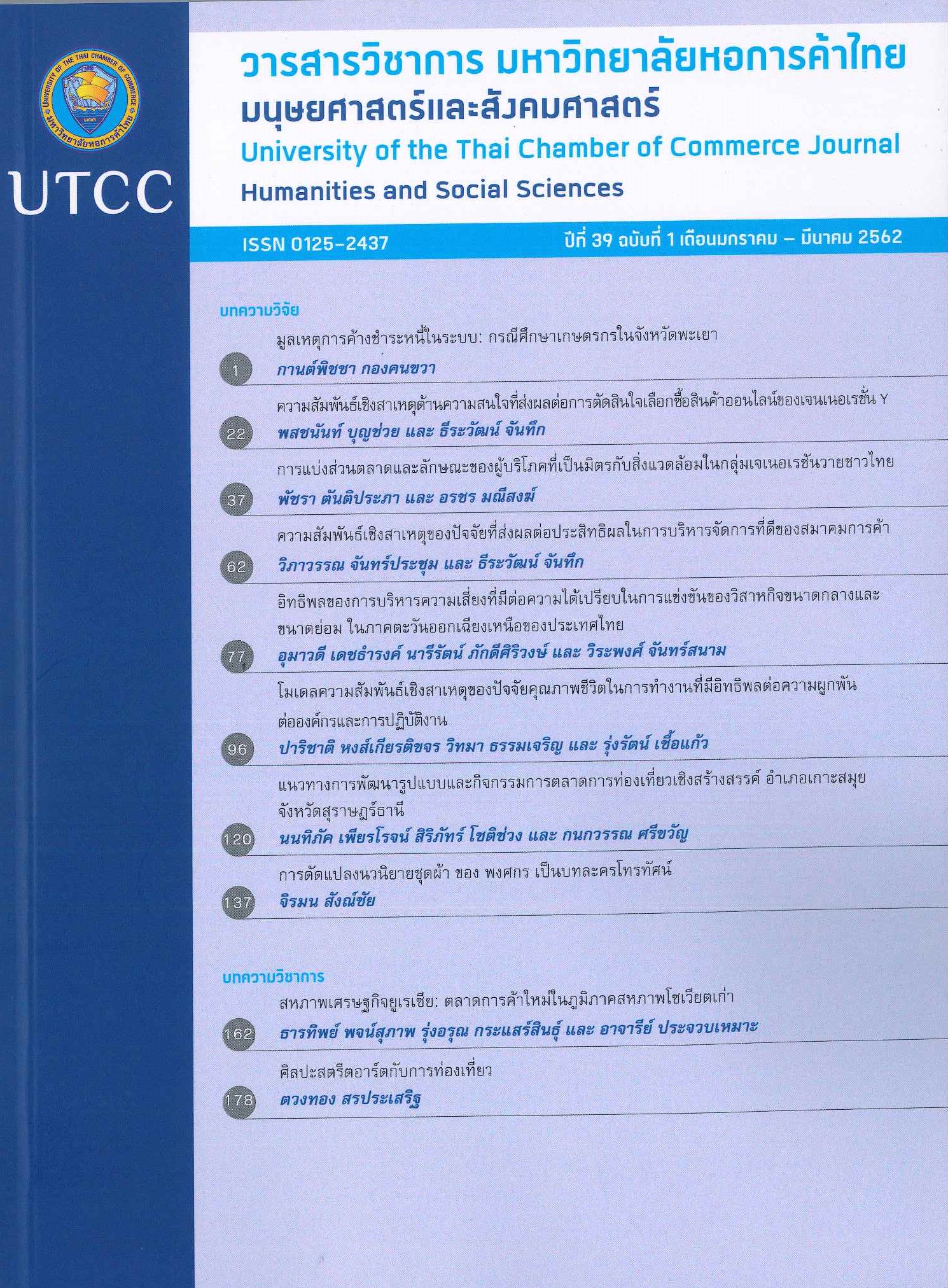Causal Relationship of Factors Affecting the Effectiveness of Good Management of Trade Associations
Main Article Content
Abstract
The purpose of this research was 1) to study the causal relationship of the factor that affected the effectiveness of good management and 2) to examine the concordance of causal relationship of the factor that affected the effectiveness of good management of trade association. The sample group totaling 260 people was the committees, members, and staffs of trade association, Ministry of Commerce. The sampling method was the selective method that was not relied on probability. The tool in this research was the opinion questionnaire. The statistics used in data analysis were frequency, percentage, mean, and standard deviation. For hypothesis
testing, researchers used goodness of fit index which consisted of chi-square value (χ2), goodness of fit index (GFI), root mean square error of approximation value (RMSEA), and comparative fit index (CFI). The cause of the factors affecting the effectiveness of good management for the trade association was analyzed and found that the χ2 value was 386.86 with statistical significance at p-value equal to 0.00. Relative chi-square value (χ2/df), CFI, GFI, adjust goodness of fit index (AGFI) and RMSEA were 6.45, 0.94, 0.81, 0.72, and 0.145, respectively. These values did not pass all criteria. After adjusting the model to meet the criteria which was consistent with the
data, the χ2 value was 39.98 with statistical significance at the p-value equal to 0.25. The relative chi-square value and CFI were 1.14 and 1.00 which passed all criteria. For good management effectiveness, the factors that affected the effectiveness of good management the most were moral and ethical aspects, followed by transparency and participation.
Article Details
ลิขสิทธิ์ของบทความ
ผลงานที่ได้รับการตีพิมพ์ถือเป็นลิขสิทธิ์ของมหาวิทยาลัยหอการค้าไทย ห้ามมิให้นำเนื้อหา ทัศนะ หรือข้อคิดเห็นใด ๆ ของผลงานไปทำซ้ำ ดัดแปลง หรือเผยแพร่ ไม่ว่าทั้งหมดหรือบางส่วนโดยไม่ได้รับอนุญาตเป็นลายลักษณ์อักษรจากมหาวิทยาลัยหอการค้าไทยก่อน
References
กัลยา วานิชย์บัญชา. (2554). สถิติสำหรับงานวิจัย (พิมพ์ครั้งที่ 6). กรุงเทพฯ: ธรรมสาร.
ธินิตา ฐิติภากร. (2546). การศึกษาเปรียบเทียบความโปร่งใสการบริหารงานของพนักงานเทศบาลตำบลและองค์การบริหารส่วนตำบล จังหวัดนครปฐม (วิทยานิพนธ์ปริญญามหาบัณฑิต ไม่ได้ตีพิมพ์).
มหาวิทยาลัยมหิดล, นครปฐม.
บวรศักดิ์ อุวรรณโณ. (2545). ธรรมาภิบาลในองค์กรอิสระ: เอกสารประกอบคำบรรยาย 8 มิถุนายน 2545.กรุงเทพฯ: สถาบันพระปกเกล้า.
พิเศษ ปั้นรัตน์. (2554). การบริหารจัดการตามหลักธรรมาภิบาล. กรุงเทพฯ: มหาวิทยาลัยเกษตรศาสตร์.
สรวิชญ์ เปรมชื่น. (2558). คุณภาพงานในการบริหารงานระบบราชการไทย. กรุงเทพฯ: สมาคมประกันคุณภาพแห่งประเทศไทย.
สันติชัย เอื้อจงประสิทธิ์. (2551). สาระสำคัญของการมีส่วนร่วมของบุคลากร. กรุงเทพฯ: สามเจริญพาณิชย์.
สุรัตน์ ฉันทะนิ. (2557). ปัจจัยการบริหารกิจการบ้านเมืองที่ดีต่อการพัฒนาคุณภาพการบริหารจัดการภาครัฐขององค์กรปกครองส่วนท้องถิ่นในจังหวัดสระบุรี. วารสารวิชาการมหาวิทยาลัยปทุมธานี, 6(2),
159-173.
Browne, M. W., & Cudeck, R. (1993). Alternative ways of assessing model fit. In K. A. Bollen & J. S. Long (Eds.), Testing structural equation models (pp. 136-162). Newbury Park, CA:
Sage.
Hair, J. F., Black, W. C., Babin, B. J., & Anderson, R. E. (2010). Multivariate data analysis (7th ed.). New York: Pearson.
McGill, M. E., & Slocum, J. W., Jr. (1994). The smarter organization: How to build a business that learns and adapts to marketplace needs. New York: Wiley.
Robbins, S. P. (1994). Essentials of organizational behavior (4th ed.). Englewood Cliffs, NJ: Prentice–Hall.


